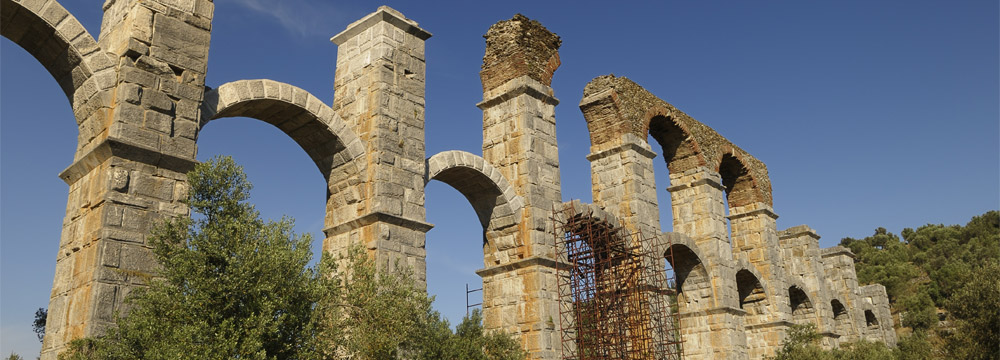The Ancient and Classical Times constituted a period of glory for Lesvos, which was famous for its naval power and already exported wine in the 7th century B.C.. No wonder that many artists and philosophers lived in Lesvos during the 7th century B.C. The Lesviots controlled many cities in the coasts of Asia while there were six important ancient cities on the actual island. Lesvos went from oligarchy to tyranny, until democracy was established after 650 B.C. thanks to the ancient politician Pittakos, who was considered one of the Seven Wise Men in Ancient Greece. In the 6thcentury, the island was conquered by the Persians.
Lesvos participated in the Peloponnesian War, initially as an ally of Athens, but eventually became an ally of Sparta. Many cities in Lesvos were destroyed during the war and, finally, the island was dominated by the Spartans from 405 to 394 B.C. In 334 B.C., the island became part of the Macedonian Empire and, after the death of Alexander the Great, it was conquered by the Ptolemies of Egypt.
In 231 B.C. an earthquake destroyed part of the island (Pyrra). During this century, the island lost its glory.
In 88 B.C. the Romans conquered Lesvos. During the Roman period, Lesvos was prosperous and many important projects were completed: the Theatre, the Aqueduct of Moria, the mosaic floors of the villas in Top Scala and the Temple of Thermia Artemis.
The Christians arrived in Lesvos in 52 A.C. during the early and mid-Byzantine period (325-1071 B.C.), and, during the first centuries of the Christian Era, Lesvos was a commercial centre characterized by prosperity and glory. However, it was attacked and despoiled several times by the Scythians, the Vandals, the Saracens, the Catalans and the Russians.
In 1204, Lesvos was conquered by the Crusaders and it came under the domination of Baldwin, the emperor of Istanbul. In 1336, the island became again part of the Byzantine Empire. During the Byzantine Period, many monasteries were built on the island, which by then belonged to the “Province of Islands”.
The Ottomans tried to occupy the Island in 1455 but did not succeed. They came back seven years later and eventually succeeded destroying most of the island killing the majority of the inhabitants. The few Christians that survived had to leave their homes and move towards the centre of the island. The situation worsened due to attacks by the French, the Venetians, the Knights of Rhodes and the Saracens. In the 1770s, the Psarians attacked Lesvos twice and destroyed two cities (Plomari and Plagia). In 1817 and 1822, the Lesviots unsuccessfully tried to revolt against the Turks.
Beginning in 1839, the island started to improve its position by shifting its economy from agriculture towards industrialization. The island’s population increased during the second half of the 19th century from about 10,000 to about 130,000. Christians were in charge of the industrialization process because the Ottomans remained loyal to the traditions of their religion. This is why the Turks on the island became less and less powerful.
Lesvos was liberated from the Turks in 1912 and was integrated into Greece in 1914. After the disaster of Asia Minor, many Greek inhabitants of the area refuged to Lesvos and the remaining Turks left the island. The economy of the island was hurt due to the interruption of commerce with the Minor Asia coasts.
Lesvos was occupied by the Germans from 1941 to 1944. Earlier, many inhabitants died during World War I and later during the Civil War (1940-1949).
After 1960, the island’s economy improved significantly and, especially, in the 1980s due to tourism. Today, Lesvos is a very prosperous island with over 100,000 inhabitants. It is an organized island, which hosts a university, banks, enterprises, and many public services.








 BACK TO LIST
BACK TO LIST